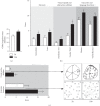Oxidative Stress and Dementia in Alzheimer's Patients: Effects of Synbiotic Supplementation
- PMID: 32411323
- PMCID: PMC7201593
- DOI: 10.1155/2020/2638703
Oxidative Stress and Dementia in Alzheimer's Patients: Effects of Synbiotic Supplementation
Abstract
Background: Alzheimer's disease (AD) is the most common cause of dementia in elderly patients. Recently, several studies have shown that inflammation and oxidative stress precede the cardinal neuropathological manifestations of AD. In view of the proven antioxidant effects of probiotics, we proposed that continuous dietary supplementation with milk fermented with kefir grains might improve cognitive and metabolic and/or cellular disorders in the AD patients.
Methods: This study was designed as an uncontrolled clinical investigation to test the effects of probiotic-fermented milk supplementation (2 mL/kg/daily) for 90 days in AD patients exhibiting cognitive deficit. Cognitive assessment, cytokine expression, systemic oxidative stress levels, and blood cell damage biomarkers were evaluated before (T0) and after (T90) kefir synbiotic supplementation.
Results: When the patients were challenged to solve 8 classical tests, the majority exhibit a marked improvement in memory, visual-spatial/abstraction abilities, and executive/language functions. At the end of the treatment, the cytometric analysis showed an absolute/relative decrease in several cytokine markers of inflammation and oxidative stress markers (·O2 -, H2O2, and ONOO-, ~30%) accompanied by an increase in NO bioavailability (100%). In agreement with the above findings by using the same technique, we observed in a similar magnitude an improvement of serum protein oxidation, mitochondrial dysfunction, DNA damage/repair, and apoptosis.
Conclusion: In conclusion, we demonstrated that kefir improves cognitive deficits, which seems to be linked with three important factors of the AD-systemic inflammation, oxidative stress, and blood cell damage-and may be a promising adjuvant therapy against the AD progression.
Copyright © 2020 Alyne Mendonça Marques Ton et al.
Conflict of interest statement
The authors declare that the research was conducted in the absence of any commercial or financial relationships that could be construed as a potential conflict of interest.
Figures







References
Publication types
MeSH terms
Substances
LinkOut - more resources
Full Text Sources
Medical

